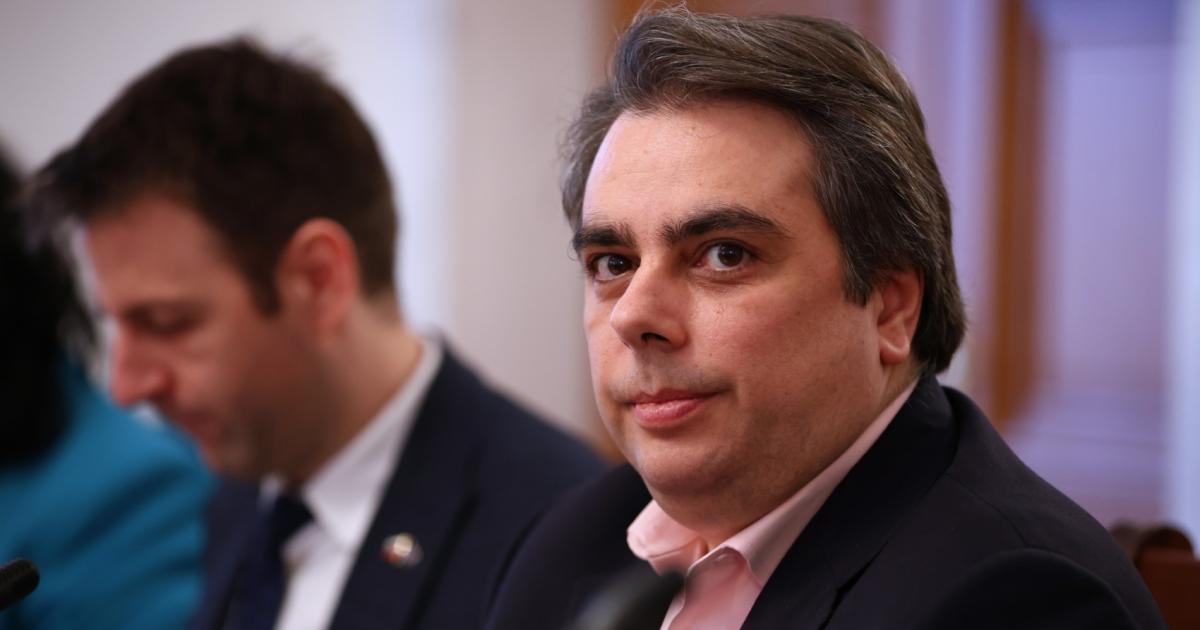Bulgarian Finance Minister Assen Vassilev`s budget plans came out short with 1.25 billion euros
The Bulgarian Ministry of Finance failed to collect about EUR 1.25 billion from the pledged revenues, subsidies and donations in the 2023 state budget. This is what Economic.bg found after calculating data from the Consolidated Fiscal Program (CFP) as of the end of December.
The main shortfall came from the Recovery Plan. The planned EUR 700 million from the second payment for Bulgaria did not make it to the budget - as Vassilev’s predecessor Rositsa Velkova had assumed they would. The money is expected to come this year, but not all the necessary legislative changes have been passed for the payment to be approved by the European Commission.
The remaining financial non-fulfilment is largely due to failures to collect VAT (value-added tax) - the largest source of revenue in the budget.
What’s more, this huge revenue shortfall was achieved in just five months. The budget that Assen Vassilev prepared for 2023 has actually been in effect since August, and it is assumed that the finance minister and his team could easily implement it. Vassilev himself claimed during the summer discussions that " tax revenues are strained, but achievable. "
VAT
The value-added tax collected in 2023 reached EUR 8.1 billion, though the target set in the State Budget Law was EUR 8.5 billion.
The " hole " of about EUR 400 million is formed mainly by uncollected VAT on imports. Although the previous director of the Bulgarian Customs Agency, Pavel Gerenski, (in charge during the previous caretaker government), warned that the revenues were decreasing mainly due to falling energy prices, Assen Vassilev opted to set very high expectations - the collection of EUR 3.4 billion. In the end, the authorities collected only EUR 3 billion
The Bulgarian Ministry of Finance is justifying this by blaming smaller import volumes, including crude oil, as well as an unfavourable US dollar exchange rate. Customs revenues are also lagging, in part because of the removal of tariffs on imports of Ukrainian industrial products.
The finance ministry`s data shows that, in terms of the origin of the imported goods, in 2023, the largest share of accrued customs revenue was from the import of Chinese goods. That revenue totals EUR 87.35 million, or more than half of all duties collected.
On the plus side, the VAT revenues, which depend on the National Revenue Agency (NRA), have been met at 100% to the amount of EUR 5.1 billion.
Tax on profits
There is also non-fulfilment when it comes to corporate tax. The Bulgarian state budget received EUR 2.45 billion from this while the set target was EUR 2.7 billion, that is there is a gap of about EUR 250 million. The Bulgarian Ministry of Finance states that this is due to
the more ambitious goals that were set for the year. "
However, the revenues from corporate taxes have grown by about EUR 130 million on an annual basis, largely as a result of the record profits achieved in the banking sector in 2023 - both in terms of value and percentage.
Thus, the total collection of revenues, subsidies and donations in the Bulgarian budget reached 96.5%.
Something positive
The above-mentioned tax collection gaps are partially compensated by the slightly higher collection of personal income taxes and excise duties. The higher income tax revenue is explained by the increase in wages in the past year and by the higher employment rate in Bulgaria. The administrative increase in the minimum wage, social security benefits and remuneration in the public administration sector has also had an impact on this.
Revenues from basic taxes in Bulgaria, 2023
Budget Target/ Implementation
Bulgarian Budget 2024
The question of whether tax revenue targets were inflated was also a main topic during the parliamentary debates of the 2024 State Budget Law. Despite the tendency for inflation to slow down, Finance Minister Assen Vassilev set a growth target in tax revenues well above the expected inflation and received a lot of criticism from experts.
Vassilev even wished to include EUR 1.2 billion from an extraordinary tax on the transit of Russian gas through Bulgarian territory, without it being clear how Gazprom would be forced to pay it. Subsequently, after much criticism from experts, the government coalition partners from GERB and DPS forced Vassilev to remove this revenue item from the budget, because its failure would threaten to send the budget deficit for 2024 above 3%.
When the gas transit fee was introduced, it quickly became clear (in the first month) that there was no way to collect it. And although the 2024 budget was saved from a bigger fiasco by eliminating it, the tax has had several other negative effects. During that month while the fee was in place, Bulgartransgaz accrued debt to the state budget to the tune of EUR 130 million, and Hungary threatened Bulgaria with a veto on the Balkan country`s accession to the Schengen Area. Thus, in the end, the government coalition decided to abolish it entirely.
Translated by Tzvetozar Vincent Iolov
The main shortfall came from the Recovery Plan. The planned EUR 700 million from the second payment for Bulgaria did not make it to the budget - as Vassilev’s predecessor Rositsa Velkova had assumed they would. The money is expected to come this year, but not all the necessary legislative changes have been passed for the payment to be approved by the European Commission.
The remaining financial non-fulfilment is largely due to failures to collect VAT (value-added tax) - the largest source of revenue in the budget.
What’s more, this huge revenue shortfall was achieved in just five months. The budget that Assen Vassilev prepared for 2023 has actually been in effect since August, and it is assumed that the finance minister and his team could easily implement it. Vassilev himself claimed during the summer discussions that " tax revenues are strained, but achievable. "
VAT
The value-added tax collected in 2023 reached EUR 8.1 billion, though the target set in the State Budget Law was EUR 8.5 billion.
The " hole " of about EUR 400 million is formed mainly by uncollected VAT on imports. Although the previous director of the Bulgarian Customs Agency, Pavel Gerenski, (in charge during the previous caretaker government), warned that the revenues were decreasing mainly due to falling energy prices, Assen Vassilev opted to set very high expectations - the collection of EUR 3.4 billion. In the end, the authorities collected only EUR 3 billion
The Bulgarian Ministry of Finance is justifying this by blaming smaller import volumes, including crude oil, as well as an unfavourable US dollar exchange rate. Customs revenues are also lagging, in part because of the removal of tariffs on imports of Ukrainian industrial products.
The finance ministry`s data shows that, in terms of the origin of the imported goods, in 2023, the largest share of accrued customs revenue was from the import of Chinese goods. That revenue totals EUR 87.35 million, or more than half of all duties collected.
On the plus side, the VAT revenues, which depend on the National Revenue Agency (NRA), have been met at 100% to the amount of EUR 5.1 billion.
Tax on profits
There is also non-fulfilment when it comes to corporate tax. The Bulgarian state budget received EUR 2.45 billion from this while the set target was EUR 2.7 billion, that is there is a gap of about EUR 250 million. The Bulgarian Ministry of Finance states that this is due to
the more ambitious goals that were set for the year. "
However, the revenues from corporate taxes have grown by about EUR 130 million on an annual basis, largely as a result of the record profits achieved in the banking sector in 2023 - both in terms of value and percentage.
Thus, the total collection of revenues, subsidies and donations in the Bulgarian budget reached 96.5%.
Something positive
The above-mentioned tax collection gaps are partially compensated by the slightly higher collection of personal income taxes and excise duties. The higher income tax revenue is explained by the increase in wages in the past year and by the higher employment rate in Bulgaria. The administrative increase in the minimum wage, social security benefits and remuneration in the public administration sector has also had an impact on this.
Revenues from basic taxes in Bulgaria, 2023
Budget Target/ Implementation
Bulgarian Budget 2024
The question of whether tax revenue targets were inflated was also a main topic during the parliamentary debates of the 2024 State Budget Law. Despite the tendency for inflation to slow down, Finance Minister Assen Vassilev set a growth target in tax revenues well above the expected inflation and received a lot of criticism from experts.
Vassilev even wished to include EUR 1.2 billion from an extraordinary tax on the transit of Russian gas through Bulgarian territory, without it being clear how Gazprom would be forced to pay it. Subsequently, after much criticism from experts, the government coalition partners from GERB and DPS forced Vassilev to remove this revenue item from the budget, because its failure would threaten to send the budget deficit for 2024 above 3%.
When the gas transit fee was introduced, it quickly became clear (in the first month) that there was no way to collect it. And although the 2024 budget was saved from a bigger fiasco by eliminating it, the tax has had several other negative effects. During that month while the fee was in place, Bulgartransgaz accrued debt to the state budget to the tune of EUR 130 million, and Hungary threatened Bulgaria with a veto on the Balkan country`s accession to the Schengen Area. Thus, in the end, the government coalition decided to abolish it entirely.
Translated by Tzvetozar Vincent Iolov
Източник: economic.bg


КОМЕНТАРИ






